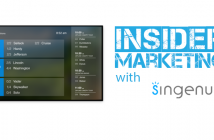Mobile and online booking software systems have become essential tools of the adventure industry. With the dozens of options available, software companies can easily overwhelm your inbox and voicemail vying for your business.
It’s not always easy to know which of these often similar softwares is ultimately best for your business. Not only that, but it’s easy to lose control of the conversation when speaking to a salesperson.
Software sales teams can be pushy—they desperately want your business. But if you know how to manage salespeople, choosing new booking software becomes easier and less stressful. As a marketer myself, I have to admit that even our Xola team can seem pushy sometimes. If we do, we apologize. We’re human too, and sometimes we just plain “get it wrong.”
But you can conquer this daunting decision—on your terms—by following these concrete steps.
Ask for a business proposal
When a salesperson first reaches out, ask for a business proposal that outlines the company’s software, services, and pricing. Having a formal proposal in your hands helps you do the following:
1.Compare various booking systems so you can easily hone in on the features or services that matter to you most.
2.Get a promise in writing so that companies come through on sales claims.
A proposal will help you keep all the systems straight and reduce B.S. by forcing companies to spell out the details. Nowadays, the devil is truly in the details when measuring one booking software against another. On the surface, so many look the same. It’s important to pay attention to the little things that can make a difference for your business.
If you’re inundated with sales emails, try copying and pasting a response like this:
Hi [person’s name],
Thank you for reaching out. I am happy to consider your booking software, but I am swamped with running my business and fielding sales calls.
Please reply to this email with a business proposal that includes:
– key features
– full pricing outline (monthly fees, credit card rates, consumer fees, and transaction fees)
– implementation timeline
– special offerings
Once I receive your proposal, and I am happy with it, I will reach out to schedule a demo.
Thank you,
[Name]
Write a list of questions
Good software solves your problems. Sales people are going to want to talk about their product’s strengths, and avoid your problems if they can’t address them. To prepare for software demos, write a list of questions that address your short term and long term needs.
Requests such as fast account implementation are important, but don’t forget about your long-term needs too.
Think about the daily functions your operation uses booking software for: managing reservations, setting up schedules, creating coupons or discounts, and plenty more. Ask questions that judge how easily you and your staff can learn and use the system, and how quickly customers can book online or over the phone.
Booking software is the backbone of any tour or activity company. It’s important to make the salesperson address your needs first.
Play hardball
With your questions prepared, don’t be satisfied with roundabout answers or unclear messages from your sales rep. Be wary of short, vague responses. Demand straightforward answers, and don’t let them move on to the next thing until they provide satisfactory information.
You can dig deeper by asking these follow-up questions:
– What – Make your sales rep spell things out in detail. If he offers to do something special for you, ask him to describe it thoroughly.
– How – Force your sales rep to get into the nitty-gritty with you. If they offer a 24-hour turnaround to get you up and running with the new software, ask exactly how the implementation process works, step by step.
– When – New product or service offerings are enticing (think: upcoming feature, or a brand-new call center), but they can take a long time to get up and running smoothly. Ask for a specific timeline on offerings and what you should expect in the meantime.
Keep in mind that salespeople only get paid if they close deals. Because of that, some will over-promise or make fantastical claims. Demand honesty and clarity, especially if it feels “too good to be true.”
Schedule demos
If a booking software company appears to meet your needs, schedule a formal walk-through. The demo is your chance to ask the probing questions that you brainstormed above.
Take notes on each software walk-through to keep your first impressions clear. The more organized you are before and during the demo, the easier it is to reach an accurate comparison.
Once you have demos lined up, stay alert to see through sales sleights of hand, like this one…
Pricing tricks
There’s no such thing as a free lunch—or free software.
Companies often use complex pricing and vague messaging to hide the real costs. Demand that they include credit card rates, consumer fees, transaction fees, and monthly fees in their pricing quote.
Remember that fees to your customers are still fees. Just because your software provider takes their cut before it hits your bank account, that doesn’t mean that its service is free.
Try turning the pricing question on its head. Instead of asking, “How much will you bill me every month?” Ask, “How much money will you make off my business every month?” Ask for an exact number based on your booking volume and online booking percentages, and don’t settle until the cost is clear.
Endorsements
One of the best, and most accurate, ways to understand a software company is to read customer reviews and case studies. They are often more honest than a sales pitch, and help you understand what the software experience is really like.
To weed out the good reviews from the bad, focus on reviews with these characteristics:
– From current customers: These should give you a recent glimpse of the software and the service.
– From long-term customers: You will be using your booking software for years to come. If customers come in happy and leave disgruntled, stay away. Look for companies with proven track records and long-term, happy customers. Take endorsements from brand new customers with a grain of salt.
– From customers like you: Not every booking software solution is built for your business model, but sales teams will want you to think that. Look for companies with a track record of serving customers from your industry.
Customer endorsements are hard-won and based on the software’s merit. It’s important to know the difference between performance-based endorsements, like customer reviews, and the rest. The more validation you can find from customers like you, the better a picture you’ll get of the software.
Discounts & special offers
Pricing discounts and special offers don’t make for better software. Good engineers do. Focus on quality software first, and make sure the price matches the value that you get from it.
Salespeople take a big risk when they discount their software. The bigger the discount, the more important it is to ask these questions:
– Is it sustainable? Many salespeople will offer discounts or special services to stay competitive, but irresponsible price slashing could jeopardize the company’s finances. Avoid fantastical promises and look for companies with a strong understanding of their software’s value.
– Is it competitive? Cheaper isn’t the same as cheapest. When a company offers a discount, ask them to translate it into dollars and compare with their competitors.
Cheap shots
Integrity matters. If you wouldn’t run your business like they do, why would you want them as a partner? Be wary of companies who use mean-spirited tactics to drag down their competitors.
That being said, salespeople are human. When your paycheck relies on making sales, things can get a little nasty. If you run into a salesperson who tries to take a cheap-shot at his/her competitors, simply ask them to stop.
You’ve got this
Choosing the right booking software is a big decision for your business. But with a little preparation and gumption, no sales tactic will get the best of you.
Interested in booking software? Check out the article “Digital Booking” from the Fall 2016 issue of Adventure Park Insider for a breakdown of what’s in store now and in the near future in the digital booking world.






